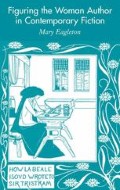Abstract
The above epigraph is from chapter 26 of Mortimer Cropper’s The Great Ventriloquist, his study of the Victorian poet, Randolph Henry Ash. It is one of the many fictional intratexts of Antonia Byatt’s novel. Even these few lines give us a sense of Cropper’s fulsome, self-satisfied prose; further acquaintance reveals that his research has little to do with ‘measured judgment’ or a ‘desire for full and calm knowledge’ and much to do with his own tortuous psyche. At the end of the book, Cropper does, indeed, ‘come a cropper’ when he is caught plundering the grave of Ash to retrieve the material that has been buried with him. The impulse to destroy or hide is evident in the texts that feature in this chapter. In Jane Gardam’s story, ‘The Sidmouth Letters’, Annie, the author heroine, inherits some lost love letters of Jane Austen and with complete ‘measured judgment’ destroys them, unread. In Ursula Le Guin’s short story, ‘Sur’, a group of South American ladies reach the South Pole three years in advance of the Norwegian explorer, Roald Amundsen. One writes a report about the trip but doesn’t publish it. In Michèle Roberts’s The Looking Glass, a number of potential female writers hesitate about writing and publishing.2 If the figure of the woman author in contemporary fiction has demanded access to the cultural sphere and support for her role as author, she has also on occasions expressed considerable doubt about what she is getting into.
Such decisions to destroy, to hide, the records of an exemplary life are made in the heat of life, or more often in the grip of immediate post-mortem despair, and have little to do with the measured judgment, and desire for full and calm knowledge, which succeed these perturbations.
A. S. Byatt, Possession: A Romance 1
Access this chapter
Tax calculation will be finalised at checkout
Purchases are for personal use only
Preview
Unable to display preview. Download preview PDF.
Notes
Antonia Byatt, Possession: A Romance (London: Vintage, 1991), p. 445.
Jane Gardam, ‘The Sidmouth Letters’, The Sidmouth Letters (London: Abacus, 1981).
Ursula Le Guin, ‘Sur’, The Compass Rose (London: Victor Gollancz Ltd., 1983).
Michèle Roberts, The Looking Glass (London: Little, Brown and Company, 2000).
Virginia Woolf, ‘Professions for Women’, in Rachel Bowlby (ed.) The Crowded Dance of Modem Life: Selected Essays Vol. 2 (Harmondsworth, Middlesex: Penguin, 1993), p. 105.
Virginia Woolf, A Room of One’s Own and Three Guineas, Michèle Barrett (ed.) (Harmondsworth, Middlesex: Penguin, 1993), p. 28.
Joan Riviere, ‘Womanliness as a Masquerade’, in Victor Burgin, James Donald and Cora Kaplan (eds) Formations of Fantasy (London: Methuen & Co. Ltd., 1986).
Janet Sayers, Kleinians: Psychoanalysis Inside Out (Cambridge: Polity Press, 2000).
Carolyn Heilbrun, Writing a Woman’s Life (London: The Women’s Press Ltd., 1989), p. 126.
Luce Irigaray, This Sex Which Is Not One. trans. Catherine Porter with Carolyn Burke (Ithaca, NY: Cornell University Press, 1985), p. 133.
Mary Ann Doane, Femmes Fatales: Feminism, Film Theory, Psychoanalysis (New York: Routledge, 1991), p. 38.
Judith Butler, Bodies that Matter: On the Discursive Limits of ‘Sex’ (London: Routledge, 1993), p. 234.
Stevie Davies Four Dreamers and Emily (London: The Women’s Press Ltd., 1996).
Michèle Roberts The Mistressclass (London: Little, Brown, 2003).
Roland Barthes, A Lover’s Discourse: Fragments, trans. Richard Howard (Harmondsworth, Middlesex: Penguin Books, 1990), p. 151.
Hélène Cixous, ‘Sorties’, in Cixous and Catherine Clément, The Newly Bom Woman, trans. Betsy Wing (Manchester: Manchester University Press, 1986), pp. 80–1.
Susan Sellers, Hélène Cixous: Authorship, Autobiography and Love (Cambridge: Polity Press, 1996).
Judith Still, Feminine Economies (Manchester: Manchester University Press, 1997).
David Lodge, Changing Places (Harmondsworth, Middlesex: Penguin, 1978).
Elizabeth Grosz, Sexual Subversions: Three French Feminists (St. Leonards, NSW: Allen & Unwin, 1989), p. 48.
Hélène Cixous, ‘Castration or Decapitation?’, trans. Annette Kuhn Signs: Journal of Women in Culture and Society, Vol. 7, No. 1, Autumn, 1981, p. 54.
Julia Kristeva, About Chinese Women [1974], trans. Anita Barrows (London: Marion Boyars, 1977), p. 39.
Makiko Minow-Pinkney, Virginia Woolf and the Problem of the Subject (Brighton, Sussex: Harvester Press Ltd., 1987), p. 196.
Sarah Sceats, Food, Consumption and the Body in Contemporary Women’s Fiction (Cambridge: Cambridge University Press, 2000).
Ursula Le Guin, Dancing at the Edge of the World (London: Paladin, 1992), pp. 172, vii and 174.
Muriel Spark, Loitering with Intent (Harmondsworth, Middlesex: Penguin, 1995), p. 69.
Friedrich Nietzsche, On the Genealogy of Morals, trans. Douglas Smith (Oxford: Oxford University Press, 1996), p. 24.
Véronique Machelidon, ‘Masquerade: A Feminine or Feminist Strategy?’, in Peter L. Rudnytsky and Andrew M. Gordon (eds) Psychoanalyses/Feminisms (New York: State University of New York, 2000), p. 106.
Barbara Johnson, The Feminist Difference: Literature, Psychoanalysis, Race, and Gender (Cambridge, MA: Harvard University Press, 1998), p. 137.
Wendy Brown, States of Injury: Power and Freedom in Late Modernity (Princeton NJ: Princeton University Press, 1995).
Vikki Bell, Feminist Imagination: Genealogies in Feminist Theory (London: Sage Publications, 1999).
Sara Ahmed, ‘Feminist Futures’, in Mary Eagleton (ed.) A Concise Companion to Feminist Theory (Oxford: Blackwell Publishing, 2003), pp. 236–54.
Copyright information
© 2005 Mary Eagleton
About this chapter
Cite this chapter
Eagleton, M. (2005). The Reluctant Author. In: Figuring the Woman Author in Contemporary Fiction. Palgrave Macmillan, London. https://doi.org/10.1057/9780230502215_8
Download citation
DOI: https://doi.org/10.1057/9780230502215_8
Publisher Name: Palgrave Macmillan, London
Print ISBN: 978-1-349-50913-3
Online ISBN: 978-0-230-50221-5
eBook Packages: Palgrave Literature & Performing Arts CollectionLiterature, Cultural and Media Studies (R0)

